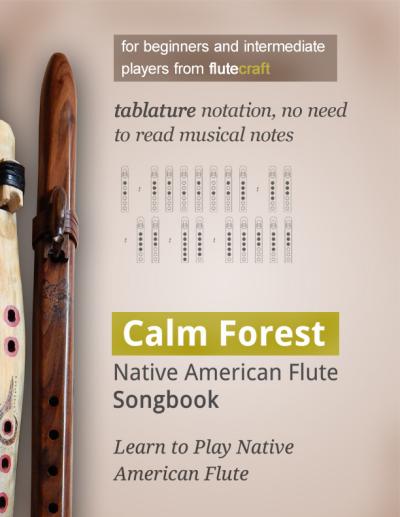There is a Japanese art, called Wabi Sabi, probably as old as Japan itself. It is embedded deeply into the Japanese culture. It is the art of seeing beauty in imperfections. Often, when I play handmade flutes, or any flutes for that matter, I think of Wabi Sabi. Because sometimes people make this tiny error: they listen to wonderful recordings of Native American style flutes, music played by artists with 20 or 30 years of experience, and they think to themselves, “I’m not that good”, with all the additional thoughts surrounding this, such as “I should quit” or “I will never be this good”, or “I’m worthless”. Yet this is a toxic way of thinking when playing an instrument.
The art of Wabi Sabi tells us a simple truth: neither the flute, nor the way you play it, has to be perfect. It just has to be. There is a beauty in imperfection. And it is healthy for your psyche.
- By the way, if you want to learn more about Wabi Sabi, I recommend the following book: “Wabi Sabi: The Japanese Art of Impermanence” by Andrew Juniper. The book is out of print these days, but Kindle edition is still available, and I’m sure you can find used copies, too. It’s a great introduction to the concept of Wabi Sabi from both historical and cultural perspective.
Music Doesn’t Have to Be Perfect
Sometimes, when you listen only to music made by professionals, you may feel discouraged. They sound so much better than you, you may think, especially when you’re an amateur. Whenever you look at something made by professionals, you see or hear the result of years of experience. Comparing yourself to someone with much more experience or knowledge than you is counterproductive and bad for your mental health.
Take a look on YouTube, or Facebook’ groups dedicated to Native American style flutes. You will notice countless people recording their music, sharing it with the world. And most of them aren’t on a virtuoso level. Some are beginners, most are amateurs. And they play for their own enjoyment, and for the enjoyment of listeners. Like in some primal, ancient way, they simply share their music with other human beings.
I’m telling you this not as a professional, but as an amateur, a hobbyist – because I understand that music should be accessible, and music should be enjoyed no matter how good you are.
The same goes for flutes themselves, as physical instruments. I think that’s why I love hand made branch flutes so much. They’re very primal, very raw. There is beauty in the imperfection of the branch, its wood, and the results of your craftsmanship. Yes, even if the branch flute looks really raw, because you’re not a very good woodworker, it is beautiful – I am not a skilled woodworker, nor I want to be (I might become one many years from now, but like the old saying goes, it’s not about the destination, but about the journey itself). That’s the point – to see beauty in things that aren’t perfect, aren’t shiny, aren’t factory-fresh.
What Imperfection Tells Us About the World
Actually, all of this applies to most areas of our life. There’s is an epidemic going on, people look at photos and videos posted on Social Media and they see happy, rich people, living a full life. But how much of this is an illusion? Actually, a lot of it. People post things on social media to feel good about themselves, and in most cases, they post only the positive stuff. They don’t share their worries, problems, illnesses – this isn’t trendy, this won’t get any “likes” or shares. And often, Social Media are only about “likes” – reactions, pressing the buttons. The more likes you receive, the more dopamine and other hormones flow into your bloodstream, and you feel good. That’s why most people don’t share their journey, full of sadness, failures and constant learning.
And thus an illusion of a perfect world is created. When we see this illusionary perfect world, and we compare our own life to the life of others, we feel bad about ourselves. But we shouldn’t, because we simply aren’t shown the “human” side of the life of others. We compare ourselves with an illusion. This is a scientific fact, a psychological thing happening in our brains.
So we compare ourselves to the false image of wealth, health and happiness. And we often compare ourselves to the false image of musical skills and expression. Don’t think this is “spiritual”, because it is not – it’s psychological. We damage ourselves psychologically when we create the feeling of self-worth based on an illusion of Social Media. Do not feel bad about yourself because you can’t play like a professional player. Enjoy the way you play the instrument, just like that.
This is what FluteCraft stands for – not just for Native American style flutes, but for all instruments!

Imperfect wooden flute, handmade from a branch.
What Do You Really Want?
Ask yourself this – do you enjoy playing the instrument? FluteCraft is all about Native American style flutes, but I do play keys, too, and I compose virtual orchestral music, and even if I’m not as good as others, I really like what I’m doing. In the modern age, with all these wonderful YouTube videos and Instagram posts showing the “perfect” life, it’s easy to get lost. It’s easy to believe you’re worthless, or not good enough, simply because you compare yourself to others. And it doesn’t matter if they’re geniuses (genii?), or simply had 20 years of practice full of failures that you’re not aware of. It doesn’t matter if you’re going to be as good as they after 20 years of practice.
What matter is this: here and now, simply enjoy what you’re doing. Enjoy the instrument, no matter which one you play. Enjoy the sound, and music, even if it’s not perfect. Enjoy the physicality of the instrument, even if it’s not the most expensive or the most beautiful flute out there. Enjoy the process of building the flute, no matter your woodworking skills. These are the life lessons I learned from FluteCraft and Native American flutes.
Do not compare yourself to others, as this is a toxic behavior that damages your own health. You have nothing to prove to anyone. You just need to find beauty in the imperfection of the reality.
And I know what I’m talking about, because I felt this way myself. I watched videos on YouTube, I watched wonderful Instagram posts, I listened to wonderful recorded and released music, and I thought “I’m not that good”. It took me years to realize I don’t have to be that good. I actually like playing the flute the way I do. I like building the flutes the way I do. No one can take this away from me.
In the end, what I always tell people is this: just play the flute. Enjoy the very act of playing, of making music. It doesn’t have to be perfect, it doesn’t have to meet any expectations. The point is to express yourself through music – your music.
Don't forget to become a fan on Facebook and subscribe to new posts via RSS or via email.










 via EMAIL
via EMAIL